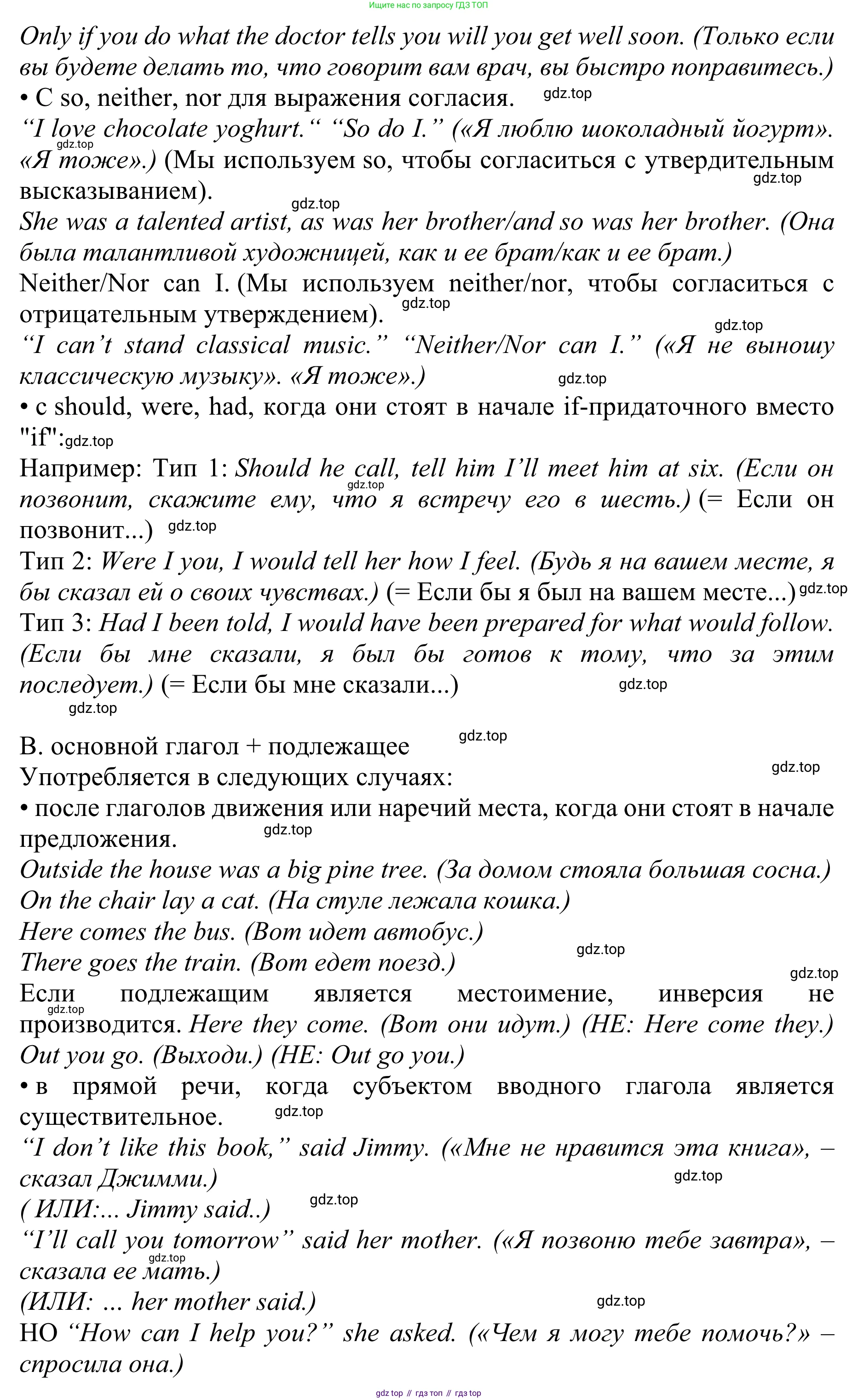Inversion, страница 175 - гдз по английскому языку 10 класс (starlight) учебник Баранова, Дули

Авторы: Баранова К. М., Дули Д., Копылова В. В., Мильруд Р. П., Эванс В.
Тип: Student's book (Учебник)
Серия: starlight (звёздный английский)
Издательство: Просвещение, Express Publishing
Год издания: 2019 - 2026
Уровень обучения: углублённый
Цвет обложки: белый, бирюзовый
ISBN: 978-5-09-112205-3
Допущено Министерством просвещения Российской Федерации
Популярные ГДЗ в 10 классе
Grammar Practice Section. Module 4 - страница 175.
Inversion (с. 175)
Условие. Inversion (с. 175)
скриншот условия

Inversion
A. modal/auxiliary verb + subject + main verb
It is used in the following cases:
in questions.
Can you really sing well?
after the following words or expressions, when they come at the beginning of a sentence.
Seldom
Only in this way
Rarely
Only then
Little
Hardly (ever) ... when
Barely
No sooner ... than
Nowhere (else)
Not only ... but (also)
Never (before)
Not until
Not (even) once
In no way
On no account
In/Under no circumstances
Only by
So/Such
Not since etc.
Never (before) have I seen such an exciting match.
Not only did they make a lot of money but they (also) made a good name for themselves.
Seldom do we go out since I took up Spanish classes.
BUT We seldom go out since I took up Spanish classes.
(There is no inversion because the word seldom does not come at the beginning of the sentence.)
Note: When the expressions only after, only by, only if, only when, not until/till come at the beginning of a sentence, the inversion is in the main clause.
Only after saving money for months was she able to buy a new car.
Only if you do what the doctor tells you will you get well soon.
"Neither/Nor can I." (We use "neither/nor" to agree with a negative statement.)
"I can't stand classical music." "Neither/Nor can I."
with should, were, had when they come at the beginning of an if-clause instead of "if":
e.g. Type 1: Should he call, tell him I'll meet him at six.
(= If he should call ...)
Type 2: Were I you, I would tell her how I feel.
(= If I were you ...)
Type 3: Had I been told, I would have been prepared for what would follow. (= If I had been told ...)
B. main verb + subject
It is used in the following cases:
after verbs of movement or adverbial expressions of place when they come at the beginning of a sentence.
Outside the house was a big pine tree.
On the chair lay a cat.
Here comes the bus.
There goes the train.
If the subject is a pronoun, there is no inversion.
Here they come. (NOT: Here come they.)
Out you go. (NOT: Out go you.)
in direct speech when the subject of the introductory verb is a noun.
"I don't like this book," said Jimmy.
(OR: ... Jimmy said.)
"I'll call you tomorrow," said her mother.
(OR: ... her mother said.)
BUT "How can I help you?" she asked.
(NOT: asked she, because the subject of the introductory verb is a pronoun.)
Решение 1. Inversion (с. 175)



Решение 3. Inversion (с. 175)
Инверсия
Ответ:
Inversion is a grammatical structure where the verb is placed before the subject. According to the provided text, it is used in two main patterns:
Инверсия — это грамматическая конструкция, в которой глагол ставится перед подлежащим. Согласно предоставленному тексту, она используется в двух основных случаях:
A. Modal/auxiliary verb + subject + main verb (Модальный/вспомогательный глагол + подлежащее + основной глагол)
This structure is used:
Эта структура используется:
1. In questions. (В вопросах.)
Example: Can you really sing well? / Ты действительно хорошо поешь?
2. After specific negative or limiting words/expressions at the beginning of a sentence (e.g., Seldom, Rarely, Never, Not only, Only if). (После определённых отрицательных или ограничительных слов/выражений в начале предложения (например, Seldom, Rarely, Never, Not only, Only if).)
Example: Never have I seen such an exciting match. / Никогда я не видел такого захватывающего матча.
3. With so, neither, nor to express agreement. (Со словами so, neither, nor для выражения согласия.)
Example: "I love chocolate yoghurt." "So do I." / "Я люблю шоколадный йогурт." "Я тоже."
4. In conditional clauses when 'if' is omitted and the clause begins with should, were, or had. (В условных придаточных предложениях, когда 'if' опускается, и предложение начинается со слов should, were или had.)
Example: Had I been told, I would have been prepared. / Если бы мне сказали, я бы подготовился.
B. Main verb + subject (Основной глагол + подлежащее)
This structure is used:
Эта структура используется:
1. After adverbs or phrases of place or movement at the beginning of a sentence (e.g., Here, There, Outside). This is not used if the subject is a pronoun. (После наречий или оборотов места или движения в начале предложения (например, Here, There, Outside). Не используется, если подлежащее выражено местоимением.)
Example: Here comes the bus. / Вот едет автобус.
2. In direct speech when the introductory verb follows the quote and its subject is a noun. (В прямой речи, когда глагол, вводящий цитату, стоит после неё, и его подлежащее — существительное.)
Example: "I'll call you tomorrow," said her mother. / "Я позвоню тебе завтра," - сказала её мама.
Другие задания:
Помогло решение? Оставьте отзыв в комментариях ниже.
Присоединяйтесь к Телеграм-группе @top_gdz
ПрисоединитьсяМы подготовили для вас ответ c подробным объяснением домашего задания по английскому языку за 10 класс, для упражнения Inversion расположенного на странице 175 к Учебник (Student's book) серии звёздный английский , starlight (старлайт) 2019 года издания для учащихся школ и гимназий.
Теперь на нашем сайте ГДЗ.ТОП вы всегда легко и бесплатно найдёте условие с правильным ответом на вопрос «Как решить ДЗ» и «Как сделать» задание по английскому языку к упражнению Inversion (с. 175), авторов: Баранова (Ксения Михайловна), Дули (Дженни ), Копылова (Виктория Викторовна), Мильруд (Радислав Петрович), Эванс (Вирджиния ), ФГОС (старый) углублённый уровень обучения учебного пособия издательства Просвещение, Express Publishing.


















